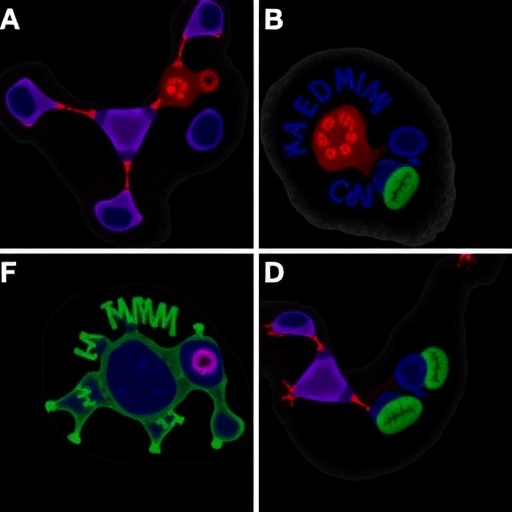In a groundbreaking advance that could reshape immunotherapeutic strategies, a recent study published in Genes & Immunity sheds new light on the nuanced effects of prednisone on a specialized subset of immune cells in patients suffering from inoperable advanced type B thymoma. The research team led by Yu, Cui, and Yang has meticulously dissected how prednisone, a widely used corticosteroid, modulates T effector memory cells expressing the surface marker CD45RA—an area that until now remained murky in oncologic immunology. This revelation not only deepens our understanding of the immune dynamics in thymoma but also opens potential avenues for tailored immune interventions in difficult-to-treat cases.
Thymomas, tumors originating in the thymus gland, are notable for their complex interplay with the immune system, given the thymus’s critical role in T cell development. Type B thymomas, in particular, are often aggressive and present significant clinical challenges, especially in advanced stages where surgical options are limited or infeasible. Prednisone has long been leveraged for its potent anti-inflammatory and immunosuppressive properties, but its precise modulatory effects on distinct T cell populations within this patient group were poorly defined—until this pivotal study.
T effector memory cells (TEM) expressing CD45RA—commonly designated as TEMRA cells—represent a differentiated subset characterized by rapid effector functions and a unique phenotypic profile. Unlike central memory T cells, TEMRA cells exhibit heightened cytotoxic capabilities and are implicated in pathogen defense, autoimmunity, and, potentially, tumor immunosurveillance. The current work elucidates how prednisone dynamically alters the behavior and frequency of these TEMRA cells in the context of thymoma, suggesting a complex immunoregulatory mechanism at play.
The researchers employed sophisticated flow cytometry and immunophenotyping techniques on peripheral blood samples from patients with inoperable advanced type B thymoma undergoing prednisone therapy. Their data reveal a significant modulation of CD45RA+ TEM cells, characterized by a decrease in their pro-inflammatory cytokine secretion capacity coupled with altered expression of activation and exhaustion markers. This dual effect points to prednisone’s paradoxical role—dampening harmful inflammation while potentially preserving or even enhancing certain immune surveillance functions.
Intriguingly, the study delves into molecular signaling pathways underlying this modulation. They identified prednisone’s influence on the glucocorticoid receptor-mediated cascade, which in turn impacts transcriptional regulators pivotal for T cell fate decisions. These findings suggest that prednisone’s impact extends beyond generalized immunosuppression, intricately reshaping the immune landscape at the cellular and molecular levels. Such insights can pave the way for judicious corticosteroid application tailored to balance tumor control and immune preservation.
Moreover, the modulation of TEMRA cells by prednisone may help explain clinical observations wherein corticosteroid treatment achieves symptom relief and tumor stabilization without severely compromising immune integrity in select thymoma patients. The research thus challenges the conventional blanket characterization of corticosteroids as merely immunosuppressive agents, highlighting their nuanced role in immune homeostasis and tumor biology.
This study also raises critical questions about the broader implications of TEMRA cell dynamics in cancer immunity. Since these cells can exert potent cytotoxic action, their suppression or functional alteration could influence tumor progression or remission. Conversely, their overactivation might contribute to autoimmune phenomena frequently observed in thymoma patients. Therefore, understanding prednisone’s modulatory effects provides a foundational framework for balancing therapeutic efficacy and adverse immune sequelae.
Importantly, the authors note that the CD45RA+ TEM cell modulation by prednisone occurs in a patient-specific and context-dependent manner, emphasizing the heterogeneity of immune responses among thymoma cases. This insight underscores the necessity for personalized immunomonitoring during corticosteroid therapy, potentially guiding dose optimization and combination treatments with emerging immunomodulatory agents.
While the study chiefly focuses on inoperable advanced type B thymoma, its implications resonate beyond this specific tumor type. The demonstrated ability of prednisone to selectively modulate memory T cell subsets could be extrapolated to other malignancies and autoimmune conditions where T cell compartmentalization critically influences disease outcomes and therapy responses.
Furthermore, the research team emphasizes the potential for integrating prednisone’s immune effects with novel checkpoint inhibitors or adoptive T cell therapies. Harmonizing corticosteroid therapy with these modalities could enhance clinical outcomes by minimizing detrimental immune suppression while preserving or boosting anti-tumor immunity.
In conclusion, this landmark investigation advances the frontier of tumor immunology by illuminating how prednisone modulates a key T cell subset in thymoma patients. The comprehensive analysis of TEMRA cells’ phenotypic and functional shifts heralds a paradigm shift in appreciating corticosteroid immunomodulation. As the field moves towards precision immunotherapy, these insights are invaluable for refining treatment strategies, ultimately aiming to improve survival and quality of life for patients contending with this challenging malignancy.
Future research inspired by these findings will likely delve deeper into the molecular intricacies governing TEMRA cell plasticity under corticosteroid influence and explore combinatorial therapeutic regimens. Such endeavors promise to unlock new dimensions of anti-cancer immunity harnessed through judicious pharmacologic modulation, marking a transformative era for patients with advanced thymoma and beyond.
Subject of Research: Modulation of T effector memory cells-expressing CD45RA by prednisone in inoperable advanced type B thymoma patients.
Article Title: Novel modulation of T effector memory cells-expressing CD45RA by prednisone in inoperable advanced type B thymoma patients.
Article References:
Yu, Xt., Cui, J., Yang, Xg. et al. Novel modulation of T effector memory cells-expressing CD45RA by prednisone in inoperable advanced type B thymoma patients. Genes Immun (2025). https://doi.org/10.1038/s41435-025-00329-3
Image Credits: AI Generated




